英语中常见的问句回答资料讲解
- 格式:doc
- 大小:18.50 KB
- 文档页数:2
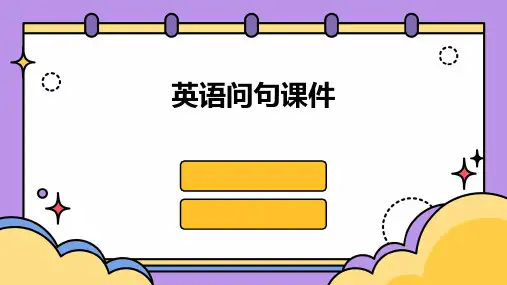
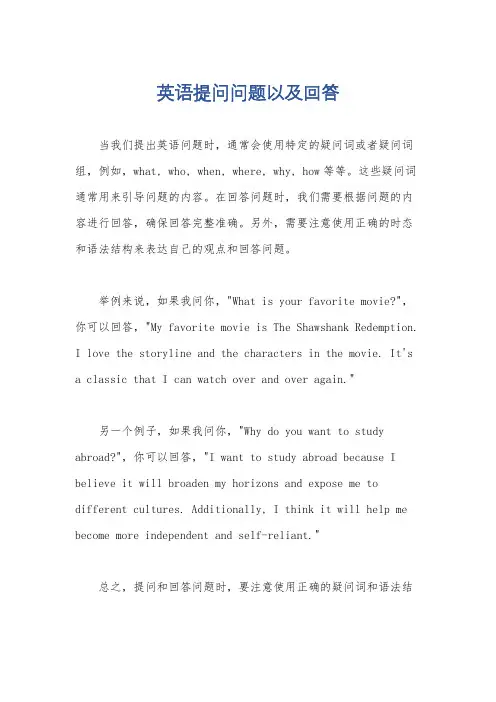
英语提问问题以及回答
当我们提出英语问题时,通常会使用特定的疑问词或者疑问词组,例如,what, who, when, where, why, how等等。
这些疑问词通常用来引导问题的内容。
在回答问题时,我们需要根据问题的内容进行回答,确保回答完整准确。
另外,需要注意使用正确的时态和语法结构来表达自己的观点和回答问题。
举例来说,如果我问你,"What is your favorite movie?",你可以回答,"My favorite movie is The Shawshank Redemption.
I love the storyline and the characters in the movie. It's
a classic that I can watch over and over again."
另一个例子,如果我问你,"Why do you want to study abroad?",你可以回答,"I want to study abroad because I believe it will broaden my horizons and expose me to different cultures. Additionally, I think it will help me become more independent and self-reliant."
总之,提问和回答问题时,要注意使用正确的疑问词和语法结
构,确保表达清晰、准确、完整。
希望这些例子可以帮助你更好地理解如何提出问题和回答问题。
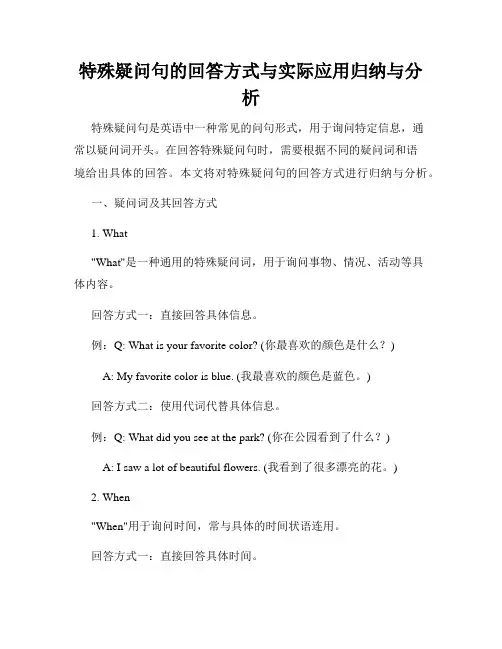
特殊疑问句的回答方式与实际应用归纳与分析特殊疑问句是英语中一种常见的问句形式,用于询问特定信息,通常以疑问词开头。
在回答特殊疑问句时,需要根据不同的疑问词和语境给出具体的回答。
本文将对特殊疑问句的回答方式进行归纳与分析。
一、疑问词及其回答方式1. What"What"是一种通用的特殊疑问词,用于询问事物、情况、活动等具体内容。
回答方式一:直接回答具体信息。
例:Q: What is your favorite color? (你最喜欢的颜色是什么?)A: My favorite color is blue. (我最喜欢的颜色是蓝色。
)回答方式二:使用代词代替具体信息。
例:Q: What did you see at the park? (你在公园看到了什么?)A: I saw a lot of beautiful flowers. (我看到了很多漂亮的花。
)2. When"When"用于询问时间,常与具体的时间状语连用。
回答方式一:直接回答具体时间。
例:Q: When is your birthday? (你的生日是什么时候?)A: My birthday is on May 20th. (我的生日是5月20日。
)回答方式二:使用时间状语回答。
例:Q: When did you go to the cinema? (你什么时候去了电影院?) A: I went to the cinema last night. (我昨晚去了电影院。
)3. Where"Where"用于询问地点或位置。
回答方式一:直接回答具体地点。
例:Q: Where is the nearest post office? (最近的邮局在哪里?)A: The nearest post office is on Main Street. (最近的邮局在主街上。
)回答方式二:使用地点状语回答。
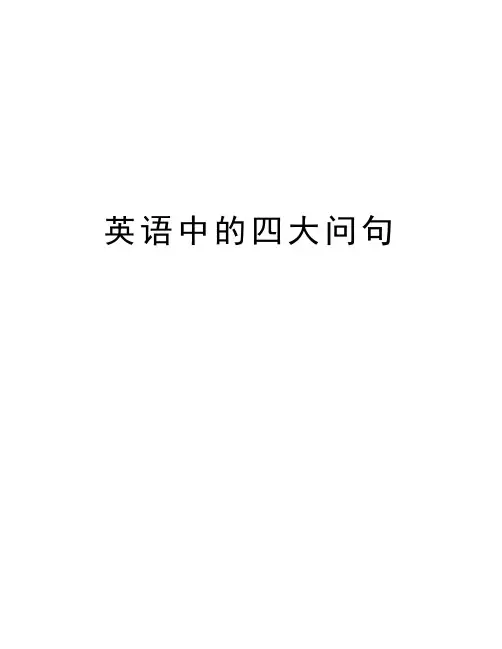
英语中的四大问句英语中的四大问句问句可以分为四类:1)一般问句(General Questions)通常以yes, no 回答:Are you from China? —— Yes, I am. 你是中国人吗?——是的,我是中国人。
Do you know Chinese? —— No, I don't. 你懂汉语吗?——不懂。
这类问题一般多用升调。
2)特殊问句(Special Questions)都用疑问词开始:Where have you been? 你到哪里去了?How do you like the weather here? 你觉得这儿的天气怎样?这类问句一般多用降调。
3)选择问句(Alternative Questions)都提出两种可能,问哪种情况属实:Are you from the South or from the North? 你是南方人还是北方人?Would you like coffee or tea? 你喝咖啡还是噶茶?这类问句的语调,一般前半句升,后半句降。
4)反意问句(Disjunctive Questions)。
也称Tag Questions(tag 指后面的简短问句)。
这种问句由两部分组成,前面是陈述句,后面为简短问句,如果前面是肯定句,后面一般为否定问句(a),如果前面是否定句,则后面多为肯定问句(b):a. This is your office, isn't it? 这是你的办公室,对吧?You come from Britain, don't you? 你是英国人,是吗?You were born in Beijing, weren't you? 你是北京出生的,对吧?b. Peter hasn't arrived yet, has he? —— No, he hasn't. 彼得还没到,对吧?——是的,还没到。
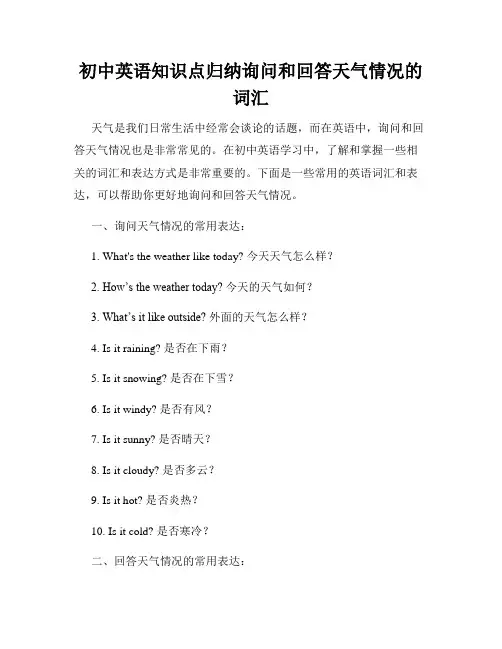
初中英语知识点归纳询问和回答天气情况的词汇天气是我们日常生活中经常会谈论的话题,而在英语中,询问和回答天气情况也是非常常见的。
在初中英语学习中,了解和掌握一些相关的词汇和表达方式是非常重要的。
下面是一些常用的英语词汇和表达,可以帮助你更好地询问和回答天气情况。
一、询问天气情况的常用表达:1. What's the weather like today? 今天天气怎么样?2. How’s the weather today? 今天的天气如何?3. What’s it like outside? 外面的天气怎么样?4. Is it raining? 是否在下雨?5. Is it snowing? 是否在下雪?6. Is it windy? 是否有风?7. Is it sunny? 是否晴天?8. Is it cloudy? 是否多云?9. Is it hot? 是否炎热?10. Is it cold? 是否寒冷?二、回答天气情况的常用表达:1. It's sunny. 天晴。
2. It’s raining. 正在下雨。
3. It’s snowing. 正在下雪。
4. It’s windy. 有风。
5. It’s cloudy. 天阴。
6. It’s hot. 天热。
7. It’s cold. 天冷。
8. It’s foggy. 有雾。
9. It’s drizzling. 正在下毛毛雨。
10. It’s stormy. 大风暴。
三、描述天气情况的常用形容词:1. Sunny. 晴朗的。
2. Rainy. 多雨的。
3. Snowy. 多雪的。
4. Windy. 有风的。
5. Cloudy. 多云的。
6. Hot. 炎热的。
7. Cold. 寒冷的。
8. Foggy. 有雾的。
9. Misty. 雾蒙蒙的。
10. Stormy. 大风暴的。
四、询问和表达具体的温度:1. What’s the temperature today? 今天的温度是多少?2. It’s 25 degrees Celsius. 温度是摄氏25度。
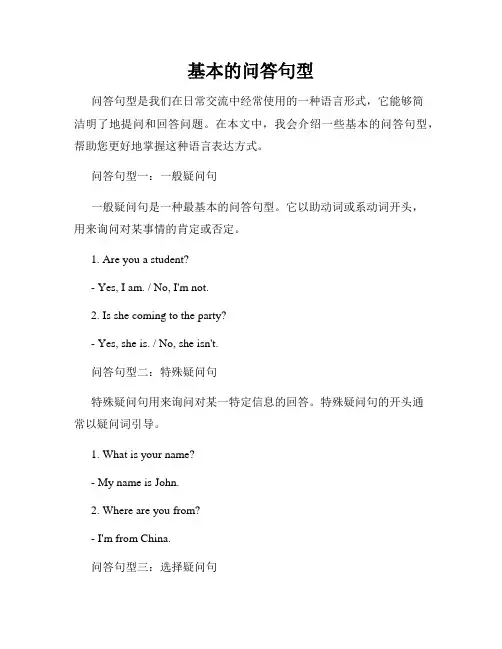
基本的问答句型问答句型是我们在日常交流中经常使用的一种语言形式,它能够简洁明了地提问和回答问题。
在本文中,我会介绍一些基本的问答句型,帮助您更好地掌握这种语言表达方式。
问答句型一:一般疑问句一般疑问句是一种最基本的问答句型。
它以助动词或系动词开头,用来询问对某事情的肯定或否定。
1. Are you a student?- Yes, I am. / No, I'm not.2. Is she coming to the party?- Yes, she is. / No, she isn't.问答句型二:特殊疑问句特殊疑问句用来询问对某一特定信息的回答。
特殊疑问句的开头通常以疑问词引导。
1. What is your name?- My name is John.2. Where are you from?- I'm from China.问答句型三:选择疑问句选择疑问句用来提供两个或多个选择,并期望对其中之一做出回答。
1. Would you like tea or coffee?- I'd like coffee, please.2. Do you prefer swimming or cycling?- I prefer swimming.问答句型四:反义疑问句反义疑问句在陈述句后面加上相反的疑问,用于提出相应的问题,以求对方确认或否定。
1. You don't like apples, do you?- No, I don't.2. He can speak Spanish, can't he?- Yes, he can.问答句型五:问句转述问句转述用来以肯定形式回答提问,而不用再次提问。
1. "Can you swim?" - "Yes, I can."2. "Is she coming?" - "Yes, she is."问答句型六:感叹句转述感叹句转述用来以陈述形式回答感叹句。
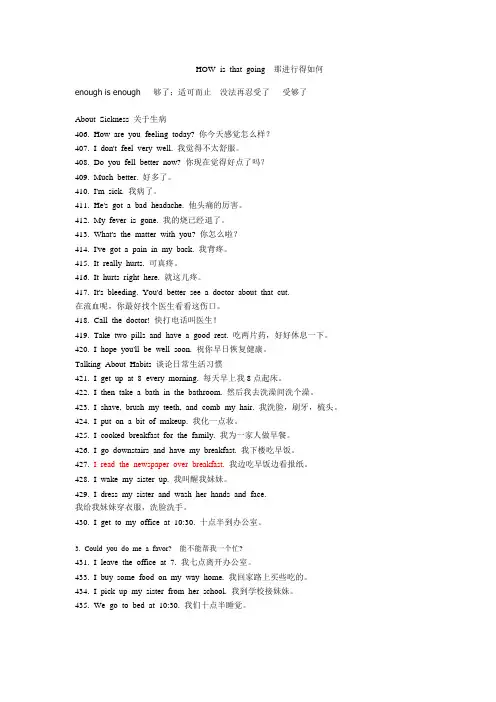
HOW is that going 那进行得如何enough is enough 够了;适可而止没法再忍受了受够了About Sickness 关于生病406. How are you feeling today? 你今天感觉怎么样?407. I don't feel very well. 我觉得不太舒服。
408. Do you fell better now? 你现在觉得好点了吗?409. Much better. 好多了。
410. I'm sick. 我病了。
411. He's got a bad headache. 他头痛的厉害。
412. My fever is gone. 我的烧已经退了。
413. What's the matter with you? 你怎么啦?414. I've got a pain in my back. 我背疼。
415. It really hurts. 可真疼。
416. It hurts right here. 就这儿疼。
417. It's bleeding. You'd better see a doctor about that cut.在流血呢,你最好找个医生看看这伤口。
418. Call the doctor! 快打电话叫医生!419. Take two pills and have a good rest. 吃两片药,好好休息一下。
420. I hope you'll be well soon. 祝你早日恢复健康。
Talking About Habits 谈论日常生活习惯421. I get up at 8 every morning. 每天早上我8点起床。
422. I then take a bath in the bathroom. 然后我去洗澡间洗个澡。
423. I shave, brush my teeth, and comb my hair. 我洗脸,刷牙,梳头。
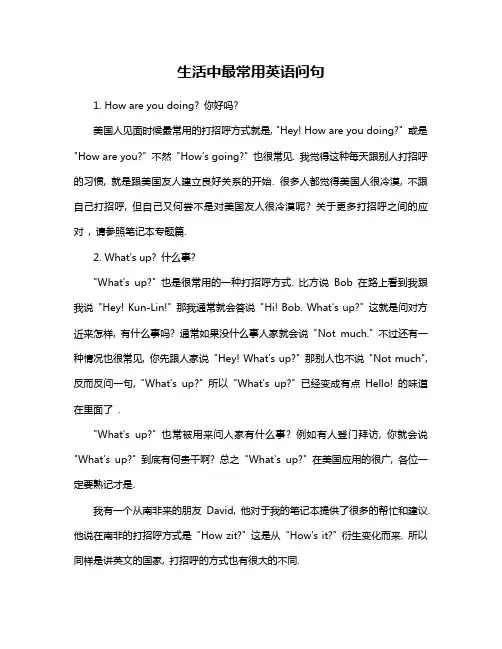
生活中最常用英语问句1. How are you doing? 你好吗?美国人见面时候最常用的打招呼方式就是, "Hey! How are you doing?" 或是"How are you?" 不然"How's going?" 也很常见. 我觉得这种每天跟别人打招呼的习惯, 就是跟美国友人建立良好关系的开始. 很多人都觉得美国人很冷漠, 不跟自己打招呼, 但自己又何尝不是对美国友人很冷漠呢? 关于更多打招呼之间的应对, 请参照笔记本专题篇.2. What's up? 什么事?"What's up?" 也是很常用的一种打招呼方式. 比方说Bob 在路上看到我跟我说"Hey! Kun-Lin!" 那我通常就会答说"Hi! Bob. What's up?" 这就是问对方近来怎样, 有什么事吗? 通常如果没什么事人家就会说"Not much." 不过还有一种情况也很常见, 你先跟人家说"Hey! What's up?" 那别人也不说"Not much", 反而反问一句, "What's up?" 所以"What's up?" 已经变成有点Hello! 的味道在里面了 ."What's up?" 也常被用来问人家有什么事? 例如有人登门拜访, 你就会说"What's up?" 到底有何贵干啊? 总之"What's up?" 在美国应用的很广, 各位一定要熟记才是.我有一个从南非来的朋友David, 他对于我的笔记本提供了很多的帮忙和建议. 他说在南非的打招呼方式是"How zit?" 这是从"How's it?" 衍生变化而来. 所以同样是讲英文的国家, 打招呼的方式也有很大的不同.3. Could you do me a favor? 能不能帮我一个忙?人是不能独自一个人活的, 需要别人帮忙的地方总是很多, 所以我就会常讲, "Could you do me a favor?" 或是"Could you give me a hand?" 这算是比较正式而礼貌的讲法. 有时候要请别人帮忙还不太好意思说, 我就会说Could you do me a little favor? 能不能帮我一个小忙? 其实也许是帮大忙但也要先讲成小忙, 先让对方点头才是. (注意一下这里用could you 会比can you 来的客气一点.) 另外, "Can you help me?" 也很常见, 通常比如说我们去买东西, 可是店员自己在聊天, 我就会说, "Can you help me?" (其实正常来说, 应该是他们主动会问"Can I help you?" 或是"May I help you?" 才对, 但有时实在等不急了, 就直接先问了"Can you help me?"4. What are you studying? 你主修什么的?通常老美一听我是学生, 都会很自然地问, "What are you studying?" 其实这样的问法就是问你"What's your major?" 但他们比较喜欢说"What are you studying?" 如果说你遇见一个人, 你也不确定他是不是学生, 我们通常会问, "What do you do for living?" 你是作什么工作的? 或是简单地问, "What do you do?" 一般不会说成"What's your job? "5. Where are you going? 你要去哪啊?通常走在路上遇到好朋友, 除了打招呼之外, 我都还会问"Where are you going?" 虽然刚来美国时我只听得懂自己的问题, 却听不懂对方的回答, 但是我还是□喜欢问. 原因无它, 听久了自然就会了. 另外老美也很喜欢用heading 这个字来代替going. 所以你也可以问"Where are you heading?" 同样都是你上哪去的意思.6. What's your favorite ice cream? 你最喜欢的冰淇淋是什么?这句话通常是当我遇到陌生人时, 又想不到其它话题的时候会最先想到的一句话. 试想二个人如果有共同的兴趣和嗜好是不是就很容易成为好朋友呢? 所以我就常问人家, "What's your favorite movie? Who's your favorite movie star?" 总之favorite 之后可以接任何你有兴趣的话题.Favorite 这个字很好用, 如果这句话你不用favorite 的话, 就会变成"What kind of ice cream do you like the most?" 听来是不是很冗长? 还有一点值得一提, 比如我要回答, 我最喜欢香草冰淇淋, 再来是巧克力要怎么说? 那就是"Vanilla is my favorite flavor and chocolate is my second favorite."7. What color is your car? What's the color of your car? 你的车子是什么颜色?个人觉得What 后面接一个名词这样的问句好用的很, 可是不知道为什么刚来美国的人似乎对这样的问法都不太熟悉. 同样的句子我就曾说过, "What kind of color does your car have?" 听来是没错, 但我跟你保证老美绝不会这样问的啦! 他们就是"What color is your car?" 有时候就干脆只说"What color?" 就完事了.让我们再来练习几句, "What year is your car?" 问你的车是几年份的? "What area do you live?" 问你是住哪一区的. 同样的How 后接一个形容词也很常用, 例如"How big is your dog?" 你的狗有多大?8. What's going on? 发生了什么事?比如说你要用电脑, 可是不知为什么无法开机, 你就可以说. "Hey, What's going on?" 虽然这句就完全等于"What happened?" 或是"What's up with that?" 但是老美还是比较比喜欢说"What's going on?" , 又比如人家问你说, "Why is our oven broken?" 你就可以推的一干二净地说. "I don't know what's going on." (我不知发生了什么事)9. How come? 为什么? (怎么会这样?)How come 的用法大部分就等于why 但是它的用法没有像why 那么广, 它通常是用在你觉得奇怪, 而问为什么的时候, 比如说有人早上一大早要去supermarket 你就会问他. "How come?" 另外, 当别人问你一个问题, 而你不想回答时可以说"How come?" 相当于, "Why do you ask that?" 也就是说"It's none of your business!" 虽然how come 跟why 的用法上差不多, 但二者的问法不同, 例如上句, "Why is our oven broken?" 换成how come 的话, 要说成, "How come our oven is broken?" 注意一下, 这二句的be 动词位置是不一样的.10. You want to go to see a movie? 你要去看电影吗?这样的句子看似不合文法, 但却是老美天天在用的句子. 他们有时候要说一个问句, 就直接把肯定句的尾音提高就成了疑问句. 其实正确的说法应该是, "Do you want to go to see a movie?" 但可能是太冗长了点, 所以老美才会直接说"You want to go to see a movie?"另外, 更口语的说法应该是"You wanna go to see a movie?" 因为在口语中他们常会把want to 省略成wanna. 或是把going to 省略成gonna. 所以这句话也可以讲成"Are you gonna see a movie?"11. Anybody needs a fork? 有没有人要叉子的啊?以前老师都教说英文中的问句只有W-H 问句. 其实不然, 我发觉还有很多种问句, 例如这个我自己称它是anybody 问句. 例如有一次我们出去玩, 一下车, 有一个老美就问说有没有人要去上厕所, 我记得很清楚她是怎么说的, "Anybody has to pee?" 是不是简单易懂?也有很多的问句是用Any 开头的, 例如"Any volunteer?" 有没有志愿的啊? 或是"Any luck today?" 今天运气好不好啊?。
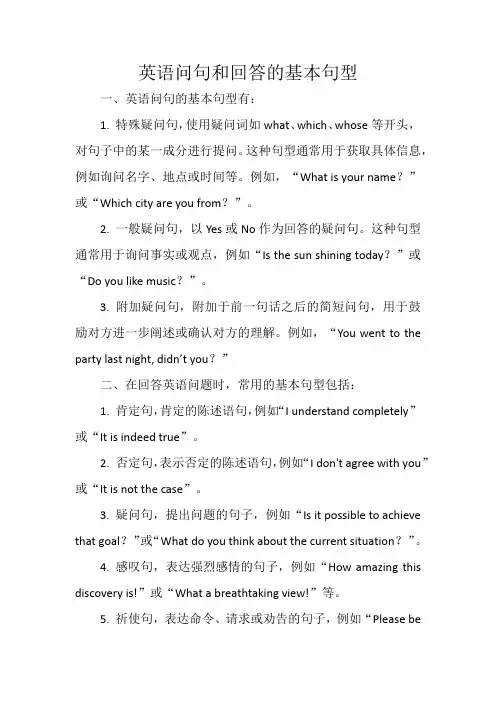
英语问句和回答的基本句型一、英语问句的基本句型有:1. 特殊疑问句,使用疑问词如what、which、whose等开头,对句子中的某一成分进行提问。
这种句型通常用于获取具体信息,例如询问名字、地点或时间等。
例如,“What is your name?”或“Which city are you from?”。
2. 一般疑问句,以Yes或No作为回答的疑问句。
这种句型通常用于询问事实或观点,例如“Is the sun shining today?”或“Do you like music?”。
3. 附加疑问句,附加于前一句话之后的简短问句,用于鼓励对方进一步阐述或确认对方的理解。
例如,“You went to the party last night, didn’t you?”二、在回答英语问题时,常用的基本句型包括:1. 肯定句,肯定的陈述语句,例如“I understand completely”或“It is indeed true”。
2. 否定句,表示否定的陈述语句,例如“I don't agree with you”或“It is not the case”。
3. 疑问句,提出问题的句子,例如“Is it possible to achieve that goal?”或“What do you think about the current situation?”。
4. 感叹句,表达强烈感情的句子,例如“How amazing this discovery is!”或“What a breathtaking view!”等。
5. 祈使句,表达命令、请求或劝告的句子,例如“Please beseated”或“Don't hesitate to ask for help if you need it”。
在回答问题时,除了使用以上基本句型外,还可以根据具体情况使用适当的形容词、副词或介词短语等来丰富回答的内容。
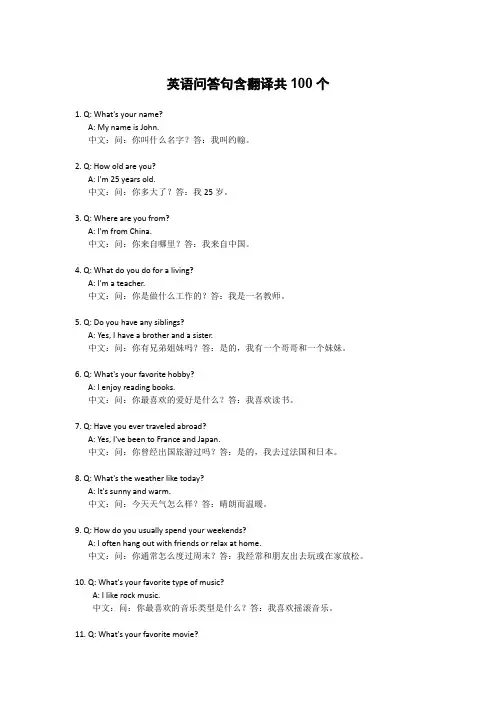
英语问答句含翻译共100个1. Q: What's your name?A: My name is John.中文:问:你叫什么名字?答:我叫约翰。
2. Q: How old are you?A: I'm 25 years old.中文:问:你多大了?答:我25岁。
3. Q: Where are you from?A: I'm from China.中文:问:你来自哪里?答:我来自中国。
4. Q: What do you do for a living?A: I'm a teacher.中文:问:你是做什么工作的?答:我是一名教师。
5. Q: Do you have any siblings?A: Yes, I have a brother and a sister.中文:问:你有兄弟姐妹吗?答:是的,我有一个哥哥和一个妹妹。
6. Q: What's your favorite hobby?A: I enjoy reading books.中文:问:你最喜欢的爱好是什么?答:我喜欢读书。
7. Q: Have you ever traveled abroad?A: Yes, I've been to France and Japan.中文:问:你曾经出国旅游过吗?答:是的,我去过法国和日本。
8. Q: What's the weather like today?A: It's sunny and warm.中文:问:今天天气怎么样?答:晴朗而温暖。
9. Q: How do you usually spend your weekends?A: I often hang out with friends or relax at home.中文:问:你通常怎么度过周末?答:我经常和朋友出去玩或在家放松。
10. Q: What's your favorite type of music?A: I like rock music.中文:问:你最喜欢的音乐类型是什么?答:我喜欢摇滚音乐。
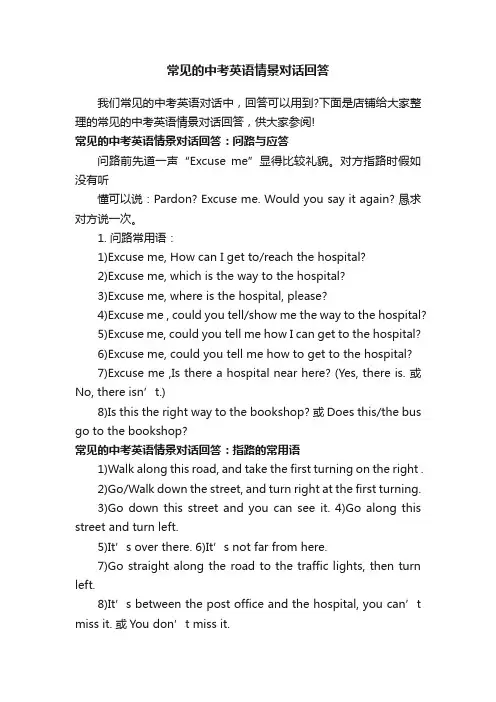
常见的中考英语情景对话回答我们常见的中考英语对话中,回答可以用到?下面是店铺给大家整理的常见的中考英语情景对话回答,供大家参阅!常见的中考英语情景对话回答:问路与应答问路前先道一声“Excuse me”显得比较礼貌。
对方指路时假如没有听懂可以说:Pardon? Excuse me. Would you say it again? 恳求对方说一次。
1. 问路常用语:1)Excuse me, How can I get to/reach the hospital?2)Excuse me, which is the way to the hospital?3)Excuse me, where is the hospital, please?4)Excuse me , could you tell/show me the way to the hospital?5)Excuse me, could you tell me how I can get to the hospital?6)Excuse me, could you tell me how to get to the hospital?7)Excuse me ,Is there a hospital near here? (Yes, there is. 或No, there isn’t.)8)Is this the right way to the bookshop? 或Does this/the bus go to the bookshop?常见的中考英语情景对话回答:指路的常用语1)Walk along this road, and take the first turning on the right .2)Go/Walk down the street, and turn right at the first turning.3)Go down this street and you can see it. 4)Go along this street and turn left.5)It’s over there. 6)It’s not far from here.7)Go straight along the road to the traffic lights, then turn left.8)It’s between the post office and the hospital, you can’t miss it. 或You don’t miss it.9)Go across the bridge , you’ll find the museum on the left.10)Go on /walk on until you reach the end of the road ,you’ll find the park in front of you.询问路程有多远的用语:1)How far is the hospital (from here)? 2)How far is it from A to B?3)How far away is the hospital? 4)How many kilometers is it from here to the hospital?4. 回答一般用:1)It’s three kilometers.常见的中考英语情景对话回答:看病1. 询问病人哪儿不舒服的常用语:1) What is the matter with you? 2)What is the matter with your + 部位?3)What is wrong? 4)What is the trouble with you?5)What is your trouble, young man? 6)Is there anything wrong with your left hand?2. 医生问病人是否已量体温及回答:1)Have you taken your temperature? 2)My temperature seems all right3)What is your temperature?3. 病人谈论病情通常为:1)I don’t feel well 2)I have a (bad) headache.3)I have got a (bad)cough. 4)I have got a bad cold .5)I have (got )a fever. 6)I have got a pain here.7)There is something wrong with my eyes. 8)I’m not very well.9)I don’t feel very well. 10)I’m not feeling very well.11)I feel terrible(bad/ill). 12)I feel tired all the time./I feel very weak.4. 医生询问病人病情像这样有多久的用语:1)How long have you had a cold? 2)How long has he been like this?3)How long have you been like this? 4)Ever since yesterday.5)For about + 一段时间5. 医生安慰病人的常用语:1)It’s nothing serious. 或Nothing serious. 2)You’ll be well (fine /OK)again in a few days.3)You’ll be all right soon. 4)Don’t worry, you’ll be well soon .6. 医生吩咐病人吃药用语:1)Take this medicine three times a day 2)Take this medicine, and then maybe you’ll be better.3)You may take some medicine. 4)T ake the medicine after meals.5)Take this medicine and drink a lot of water.6)Here is your medicine ,please take this medicine every four hours.7. 医生嘱咐病人要干什么/注意什么的用语:1)Have a good rest.2)Drink more water and have good rest, you’ll be all right in a few days(soon).3)You must stay in bed for two or three days and take this medicine on time , y ou’ll be all right.4)Please be careful with your heal from mow now on.5)Please stay at home and look after yourself well6)If you want to be healthier and thinner, you have to eat less food and take more exercises.7)Doing morning exercise is good for your health.8)Doing eye exercise is good for our health.9)Taking a walk after supper is good for your health.9)Eating too much /going to bed too late in the evening is bad for your health.10)Read in bed /in the sun is not good for your eyes.8. 病人谈论自己的感受用语:1)Are you feeling a little better? 2)I feel fine ( all right /well /better).3)I’m feeling much better than before. 4)I feel very terrible.5)I feel even worse.。
英语中疑问分类-回复疑问分类在英语中是一种将疑问句按照其语法结构或表达方式进行分类的方法。
通过对疑问句的分类,我们能够更好地理解和运用英语的疑问句。
以下是对英语中疑问分类的详细介绍。
1. 一般疑问句(yes/no questions)一般疑问句是最基本的疑问句形式,在句首是一个助动词或者be动词,并且用于询问对事实或情况的确认或否定。
回答该类型的问题通常可以用yes或no来回答。
例如:- Do you like coffee?(你喜欢咖啡吗?)- Is she going to the party?(她要去派对吗?)2. 特殊疑问句(wh- questions)特殊疑问句是以特殊疑问词(wh-词)开头的疑问句,这些特殊疑问词包括what、where、when、why、who、how等。
特殊疑问句用于询问事物的特定信息或详细情况,需要回答的不仅仅是yes或no。
例如:- What is your favorite color?(你最喜欢的颜色是什么?)- Where did you go last weekend?(你上个周末去了哪里?)- How are you feeling today?(你今天感觉如何?)3. 选择疑问句(choice questions)选择疑问句通常用于提供几个选项,询问对方在这些选项中选择哪一个。
这种疑问句的答案是通过在选项中做出选择来回答的。
例如:- Would you like tea or coffee?(你想要茶还是咖啡?)- Do you prefer dogs or cats?(你更喜欢狗还是猫?)4. 带有助动词"do"的疑问句(questions with the auxiliary "do")带有助动词"do"的疑问句通常用于询问某件事情是否发生过或者某个情况是否存在。
这种疑问句的回答通常也是用yes或no来回答的。
六年级英语问答句技巧嘿,小朋友们!六年级的英语学习可是很有趣的哦!特别是那些问答句,就像一把钥匙能打开英语知识的大门呢!咱先说说一般疑问句吧。
这不就像是在和英语小精灵对话嘛,问它一个问题,然后等待它回答是或不是。
比如说“Do you like apples?”你喜欢苹果吗?你就回答“Yes, I do.”或者“No, I don't.”多简单呀!就好像你问小伙伴喜不喜欢吃糖果一样自然。
特殊疑问句呢,就像是在英语世界里的探索之旅。
“What's your name?”你的名字是什么呀,“How old are you?”你多大啦,这些问题就像一个个小线索,能让你了解更多呢!就好像你好奇小伙伴的各种小秘密一样。
回答特殊疑问句的时候呢,可不能马虎哦!要准确地把答案说出来。
比如说人家问“What color is it?”你就得看看那个东西到底是什么颜色,然后响亮地回答出来呀。
这就好比你看到了一只漂亮的蝴蝶,你得准确地说出它的颜色呀,对吧?还有呀,反意疑问句也很有意思呢!“You are a student, aren't you?”你是个学生,不是吗?这时候你就得机灵点,根据实际情况回答啦。
就像人家和你开玩笑,你得反应过来一样。
在英语问答句中,要注意发音哦!可不能含含糊糊的,得像唱歌一样把每个单词都清晰地说出来。
不然别人听不懂你的问题或者回答,那不就糟糕啦!就像你说话含着一颗糖果,谁能听清你在说啥呀。
还有哦,平时要多和小伙伴用英语问答呀,这样才能越来越熟练呢!别害羞,大胆地说出来。
想象一下,你和小伙伴用英语一问一答,多酷呀!就好像你们在演一场小小的英语剧呢。
总之呢,六年级的英语问答句技巧就是要多练习、多开口,别怕犯错。
把英语当成你的好朋友,和它尽情地交流吧!相信你们一定能把这些问答句掌握得棒棒的!加油哦,小朋友们!。
小学英语肯定句、否定句、一般疑问句和特殊疑问句的详解一、be动词:am, is, are二、肯定句、否定句、一般疑问句和特殊疑问句定义1.肯定句:表示肯定的意思, 即不含有否定词“不”。
比如:我是一个学生I am a student.他去上学He goes to school.2.否定句:表示否定的意思。
比如:我不是一个男孩。
I am not a boy他不去上学He does not go to school.3. 一般疑问句:回答为“是yes”或者“否no”的问句。
比如:你是一个学生吗?Are you a student?你喜欢英语吗?Do you like English?4. 特殊疑问句:回答不是“是yes”或者“否no”的问句,根据提问内容具体回答。
比如:现在几点了?What’s the time?哪一支笔是你的?Which is your pen?三、肯定句、否定句、一般疑问句和特殊疑问句的相互转换肯定句变否定句:在am, is, are后面加上not,其余按顺序照抄。
am, is, are提前放到句首并大写Am, Is, Are,其余照抄。
肯定句变特殊疑问句(就划线部分提问):分3步骤第一步:先变一般疑问句第二步:找合适的特殊疑问词代替划线部分第三步:特殊疑问词提前放到句首,并大写,其余按顺序照抄,省略划线部分。
注意:1.如:Li ming 's not here today. Who's not here today? 今天谁没来?2.划线部分不能在特殊疑问句中出现。
例如:1.肯定句、否定句和一般疑问句的互换肯定句:This is a book.否定句:一般疑问句:Is this a book?肯定回答:Yes, it is.否定回答:No, it isn’t.2.就划线部分提问(变特殊疑问句)This is a book.第一步:变一般疑问句Is this a book?第二步:找合适的特殊疑问词Is this what ?第三步:特殊疑问词提前放到句首,并大写,其余按顺序照抄,省略划线部分。
初中英语问与答的各种方式及其意义初中英语问与答的各种方式及其意义学习问与答,要掌握问的形式、词序和用词及其实际意图;答的方式和用词,要根据客观事实、英语的思维方式和词的意义做答。
第一种:简单问及其词序简单问句必含助动、系动或情助:有情助时,情助为先;没情助而有助动have三形时,have三形为先;没情助也没助动have三形而有be五形时,be五形为先;最后是助动do三形为先.一、直接问句:情助或助动或系动(助动或实义系词)+主句?例句1~7为情助问句;8~10为have三助问句;11~18为系动be五形问句。
------------------------------------------------------------------------1. Must I go now?2. Need he go to a doctor?3. May I help you?4. Can/Could you do me a favor?5. Will/Would you please give me a hand?6. Will you be a doctor when you grow up?7. Shall I/he/she join you?--------------------------------------------------------------------8. Have I/you/we/they been there?9. Has he/she been there?10. Had I/he/she/you/we/they been there?------------------------------------------------------------------ 11. Is this a book?12. Are you/we/they students?13. Am I hungry?14. Was he/she ill?15. Were you/we/they laughing?16. Do you have a pen?17. Does he get up early every day?18. Did you ever see this film?---------------------------------------------------------------------------二、主句+辅助问句这种问句一般需含否定,但只能否定一次,因此,前否则后肯,前肯则后否;后否的否定形式为缩写式。
小学英语答语知识点总结在学习英语的过程中,掌握正确的答语能力是非常重要的。
正确的答语不仅可以帮助学生更好地理解和学习英语,还可以提高学生的口语表达能力。
下面将对小学英语答语知识点进行总结。
1. 问候在日常生活中,我们经常会使用一些问候语和交流语,比如“你好”、“早上好”、“下午好”、“晚上好”等。
对于这些问候语,我们需要掌握正确的答语。
- Hello! / Hi! / Good morning! / Good afternoon! / Good evening!- Hello! / Hi! / Good morning! / Good afternoon! / Good evening!2. 介绍自己当我们遇到新的朋友时,通常会用一些句式来介绍自己,比如“My name is…”、“I am…”等。
对于这些句式,我们需要学会正确的答语。
- What's your name?- My name is Alice.- How old are you?- I am ten years old.- Where are you from?- I am from China.3. 询问个人信息在日常交流中,我们经常会询问他人的个人信息,比如年龄、家庭背景、爱好等。
对于这些问题,我们需要学会正确的答语。
- How old are you?- I am ten years old.- Where do you live?- I live in Beijing.- Do you have any brothers or sisters?- Yes, I have one brother and one sister.4. 询问时间在日常生活中,我们经常需要询问时间,比如“现在几点了?”、“你什么时候起床?”等。
对于这些问题,我们需要学会正确的答语。
- What time is it now?- It's 7 o'clock.- When do you get up in the morning?- I get up at 6 o'clock.5. 询问地点在日常交流中,我们还需要询问地点,比如“你去哪里了?”、“你家在哪里?”等。
英文问句的构成及肯定与否定回答在日常生活中,我们经常会使用英文问句来询问事物的情况、观点或者向他人寻求帮助。
英文问句的构成有一定的规则,同时,对于这些问句的肯定与否定回答也有一定的技巧。
本文将介绍英文问句的构成方式以及肯定与否定回答的方法。
一、英文问句的构成方式英文问句的构成方式有多种,下面将介绍几种常见的构成方式。
1. 使用助动词在英文问句中,常常会使用助动词来构成问句。
例如,我们可以使用助动词"do"来构成一般疑问句。
比如,“Do you like coffee?”(你喜欢咖啡吗?)这里的助动词"do"帮助我们构成了一个疑问句。
2. 使用疑问词另一种构成英文问句的方式是使用疑问词。
疑问词是用来引导问句的词语,例如"what"(什么)、"where"(哪里)、"when"(何时)、"why"(为什么)等。
通过使用疑问词,我们可以提出具体的问题。
比如,“What is your favorite color?”(你最喜欢的颜色是什么?)3. 使用倒装结构除了使用助动词和疑问词,我们还可以使用倒装结构来构成英文问句。
倒装结构是指将助动词或情态动词放在主语之前,从而构成问句。
例如,“Are you going to the party?”(你要去派对吗?)这里的助动词"are"位于主语"you"之前,构成了一个疑问句。
二、肯定与否定回答的方法对于英文问句的肯定与否定回答,我们需要根据问句的构成方式来进行回答。
下面将介绍几种常见的肯定与否定回答方式。
1. 对于一般疑问句对于一般疑问句,我们可以用"Yes"或"No"来进行回答。
例如,如果有人问你"Do you like coffee?"(你喜欢咖啡吗?),你可以回答"Yes, I do."(是的,我喜欢)或者"No, I don't."(不,我不喜欢)。
姓名、年龄等
1.What’s your name? What’s your English name?
2.How old are you ?
3.What grade/class are you in?
4.Where are you from? Where do you come from?
5.Are you from Zhangdian ?
6.What school are you from?
7.How are you?
8.What’s your English teacher’s name? How long have you learned English? 9.What’s your father’s name?
10.How many people are there in your family?
11.Which do you prefer singing or dancing?
12.Do you often go to the zoo?
13. Which do you prefer monkeys o r elephants?
14. Which do you like best, blue, green or purple?
15. Do you like your mother?
16.How old is your father/mother?
17.Can you play the piano?
18.What’s your favorite food?
19.What’s your favorite color?
20.Can you play the violin?
21.Which do you prefer, your English teacher or Chinese teacher? 22.Can you play football?
23.Which do you prefer, rice or noodles?
24.Do you like your school? Why?
25.Which do you prefer ,cartoons or news?
26.How many bananas are there in the picture?
27.What color are they?
天气、时间等
1.What day is today? Today is
Monday/Tuesday/Wednesday/Thursday/Friday/Saturday/Sunday.
2. What’s the weather today? It’s sunny/ rainy/ cloudy/ windy.
3. What time do you often get up?
4. What time do you have breakfast/lunch?
运动、食物、颜色等
1. What’s your favorite animal/color/ food?
2. What animal don’t you like?
3. What food don’t you like?
4. Do you like playing football?
5. Do you like Yao Ming? Why?
6. Do you like other sports?
7. What’s your favorite sport?
8. Do you like basketball?
9. What color is your shirt?
10. What do you like to eat?
爱好、宠物等
1. Do you like English book?
2. If you don’t like reading, what do you like ?
3. Do you have a pet?
4. Do you have a cat or a dog?
5. Do you like sports?
6. What do you like ? I like reading and watching TV.
7. What do you hope for? I hope to be a doctor.
8. In the future, what job do you want?
9. If you want to be a millionaire, what would you buy?
10. Do you like cars? What color cars?
11. Do you like banana? Do you eat banana every day?
12. What’s your mother’s job?
13. Do you like a sunny day or a rainy day? Why?
14. Do you like summer or winter? I like summer because I can go swimming.
15. Do you like watching TV?
参考内容:
(Color颜色:pink 粉红purple 紫色red 红色silver 银白色blue蓝色green 绿色white 白色yellow 黄色beige 米色black 黑色brown 咖啡色grey 灰色off-white 灰白色)
(Sport运动:体操gymnastics 游泳swimming 篮球basketball 排球volleyball 乒乓球table tennis网球tennis 冲浪surfing 自行车cycling 羽毛球badminton 摔跤wrestling football 足球rugby 橄榄球ice skating 滑冰high jump 跳高long jump rowing 划船)
(Food 食物:rice米饭bread面包beef牛肉milk牛奶water水egg蛋fish鱼cake蛋糕hamburger汉堡包French fries炸薯条noodles面条meat肉chicken鸡肉ice-cream冰淇淋Coke可乐juice果汁tea茶breakfast早餐lunch午餐dinner/supper晚餐meal一餐apple 苹果banana香蕉pear梨orange橙watermelon西瓜grape葡萄eggplant茄子green beans 青豆tomato西红柿potato土豆peach桃strawberry草莓cucumber黄瓜onion洋葱carrot 胡萝卜)。